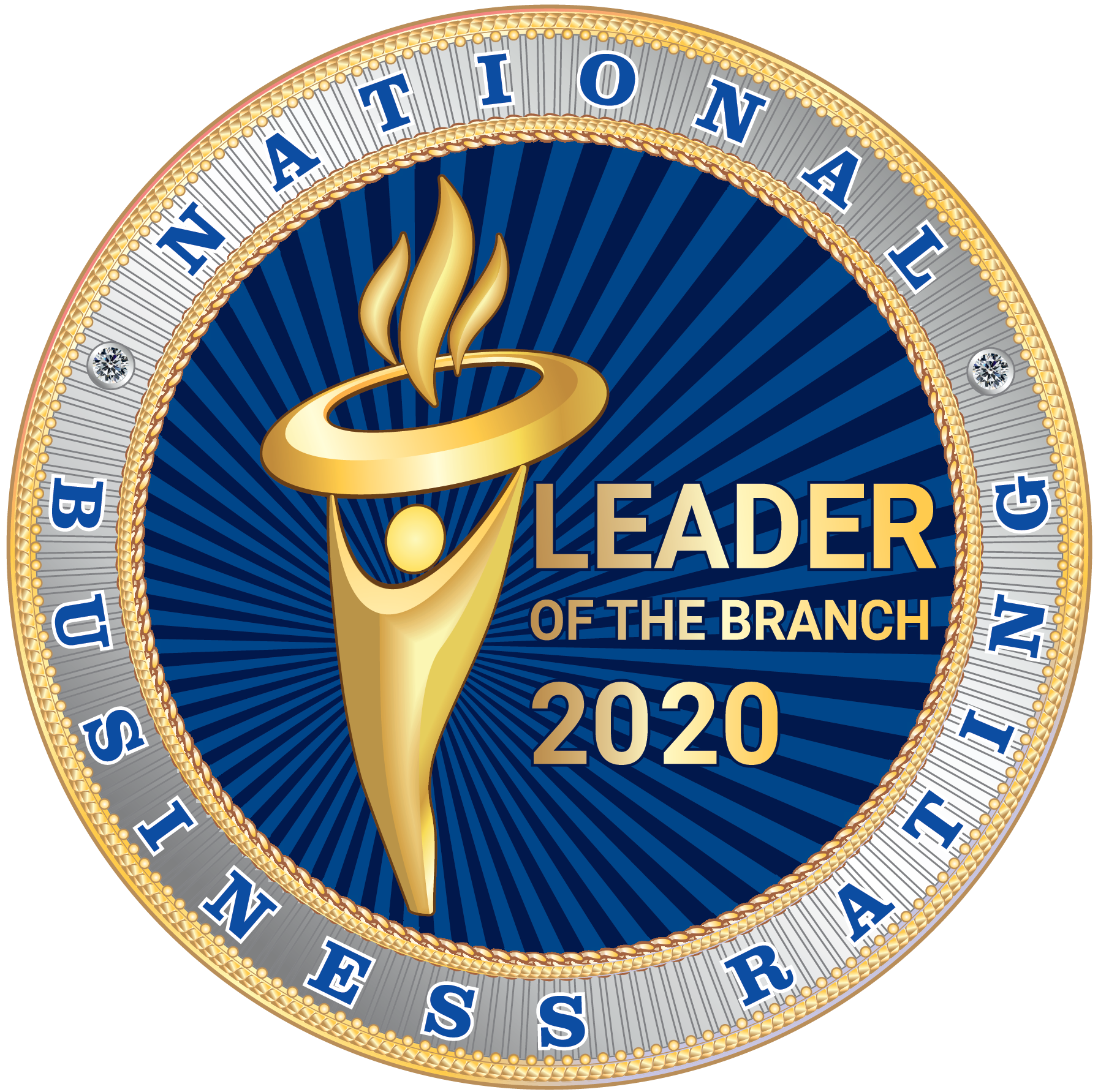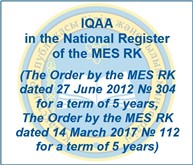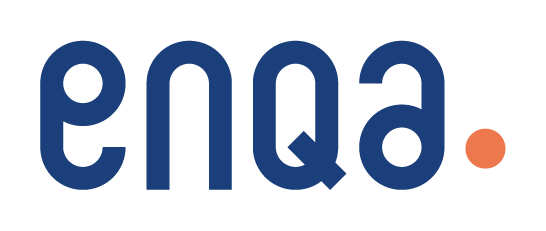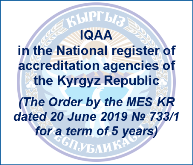Code of Honor for External Experts
1. General provisions
The Code of Honor for experts on institutional and/or programme accreditation of higher education institutions of the Republic of Kazakhstan (hereinafter – the Code) sets general standards of conduct for external experts on accreditation of Kazakhstani educational institutions in accordance with generally accepted moral and ethical norms.
Participation in accreditation of higher education institutions is an expression of special confidence from the side of educational institutions and the Independent Agency "Independent Kazakh Agency for Quality Assurance in Education", and it places high requirements on morality and moral and ethical image of experts.
Trust and confidence in accreditation depend on the competences of those who conduct assessment. This competence is based on the demonstration of:
- personal qualities
- ability to perform their duties, application of knowledge and skills acquired during their study, work, training and experience in conducting assessment
Experts maintain and improve their competences through continuing professional development and regular participation in assessments.
2. Personal qualities
An expert shall have personal qualities, which allow him/her act according to the principles of assessment.
An expert must be:
- independent, i.e. to express personal opinion on accreditation of higher education institutions
- decent, i.e. to be truthful, sincere, honest, discreet and prudent
- open, i.e. to be able to consider alternative ideas or points of view
- observant, i.e. to actively acquaint with other people and their activities
- versatile, i.e. to be ready to adapt to different situations
- persistent, to be focused on achieving objectives
- resolute, i.e. to make timely decisions based on logical reasoning and analysis
- confident, i.e. to be able to act independently as well as effectively collaborate with others
- diplomatic, i.e. to know how to tactfully interact with people
3. Obligations of the expert
An expert shall be ready for the following:
- adherence to the agreed aim and deadlines of the Agency
- careful study of the report on self-assessment and other materials submitted for the institutional and/or programme accreditation
- application of the principles, procedures and methods of the external assessment of higher education institutions
- effective planning and organization of work
- holding of the external assessment of higher education institutions within scheduled time
- setting priorities and guidance in important moments
- data collection through effective surveys, interviewing, questionnaires, observation and analysis of documents, records and data
- understanding of the relevant methods and results of selective research for conducting a review
- verification of the accuracy of the accumulated data
- evaluation of factors, which can affect the accuracy of findings and conclusions of the external assessment of higher education institutions
- usage of working documents for recording activity during the external assessment of educational organizations
- productive exchange of information through personal knowledge of language or with the help of the interpreter
- keeping confidentiality
In their activities, experts, who conduct accreditation procedure of higher education institutions of the Republic of Kazakhstan, shall:
- be guided by the principles of legal laws, strictly abiding by the Constitution and following the laws of the Republic of Kazakhstan, Acts of the President of the Republic of Kazakhstan and other regulatory legal acts of the Republic of Kazakhstan
- ensure respect for and protection of the rights and interests of higher education institutions of the Republic of Kazakhstan, and not allow actions involving violation of rights
- strictly abide by the labor discipline, faithfully, impartially and efficiently perform their duties, and effectively use their working hours
- strive to get high standards of performance, use optimal and cost-effective ways to achieve objectives
- confront manifestations of corruption
- prevent interference in their activities and lobbying of interests of individual subjects
- prevent the use of confidential information for financial gain or other personal purposes
- contribute to a stable and positive moral and psychological climate in a team by personal attitude to the subject and personal behavior
- confront actions preventing proper performance of their duties
- not allow and prevent cases of violations of professional ethics on the part of other experts
4. Rights of experts
Experts have rights to:
- submit proposals in an established order to the Independent Agency "IQAA" in order to improve the assessment system of higher education institutions and accreditation procedures
- request and receive documents, materials and information needed to fulfill their tasks from the administration of educational institutions
- ask for oral and written explanations from relevant officials working at higher education institutions
- conduct conversations, questionnaires, interviews with university and college administration, faculty members, staff, students and employers
- provide a report or a statement on results of their work, or on a particular stage of work in the Independent Agency 'IQAA"
5. A conflict of interests
The IQAA does not appoint an applicant to be a member of the expert group if there is even a slightest suspicion on a possible conflict of interests. According to this policy, an expert cannot be a person who:
- works in the organization, which is a part of the same system with this higher education institution under review
- during the last year has been a candidate for the vacant position in this institution
- during the last 5 years has been an employee of this higher education institution, or otherwise related to it
- has joint business, advisory or other interests and relations with this higher education institution
- has relationships with any member of the staff from this higher education institution
- expresses a personal opinion regarding the accreditation of this higher education institution
- is a graduate of this higher education institution
- refers to the administration of this higher education institution (senior administration)
- presents any other personal arguments on possible conflicts of interests
To ensure a complete understanding of the policy of IQAA on a conflict of interests, the head and members of the expert group must sign the Code of Honor for Experts.
The higher education institution is committed to respect the members of the expert group and not to offer them to work as consultants or employees within the next year.
6. Head of the expert group
The head of the expert group, who conducts an external assessment of higher education institutions shall:
- precisely define tasks and scope of duties for each member of the expert group in accordance with their positions, and not require them to execute orders, which go beyond the mandate of the expert
- not allow groundless accusations, facts of rudeness, tactlessness, etc. in relation to members of the expert group
- not compel members of the expert group to commit unlawful acts or acts, which are inconsistent with generally accepted moral and ethical norms
7. Public speaking on the activities of the expert group
Public speaking on the activities of the expert group is delivered by its Head or another authorized person.
8. Experts shall conduct their discussions in a correct manner
Experts shall conduct their discussions in a correct manner without undermining the credibility of the expert group.
9. Experts should not publicly express
Experts should not publicly express their opinions on the accreditation of higher education institutions, if
- it discloses the information, which is not permitted to be revealed
- it contains unethical remarks against anyone
10.In case of groundless public accusations of an expert
In case of groundless public accusations of an expert in lobbying for anyone's interests, corruption, he/she shall take measures to refute these accusations.
11.In relation to the staff of higher education institutions, which undergo accreditation, the experts shall:
- express modesty, not emphasize and not use their official position
- not give rise to justified criticism from a higher education institution by their actions and decisions; use constructive criticism to eliminate any shortcomings and improve their professional activities
- comply with generally accepted moral and ethical norms, be polite and tactful
12.Compliance with this Code by experts
Compliance with this Code by experts constitutes their official duties
13. In case of the violation of requirements
In case of the violation of the requirements set by this Code and/or receipt of reasoned statements in a written form from higher education institutions concerning incompetence of experts, the Independent Agency "IQAA" has a right to include these experts in the "blacklist of experts" of the Agency and to prohibit their participation in the procedures of external assessment henceforth















